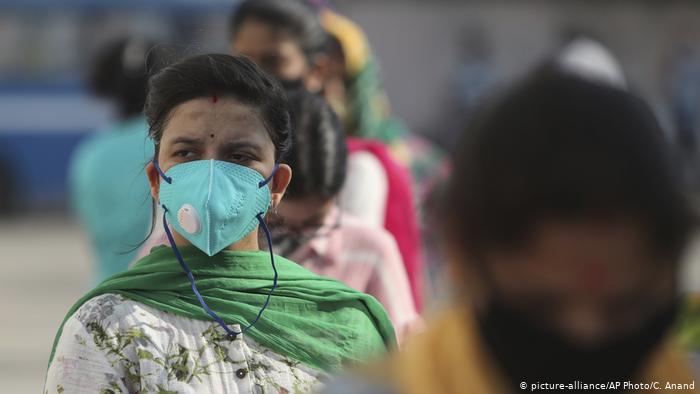People in India are increasingly lowering their guard during the ongoing festival season, despite the high risk of contracting COVID-19. Many restrictions have been lifted, but the pandemic is far from over.
Rudra Nath, 42, a factory foreman in Alwar district of Northwestern Rajasthan state, says he feels exasperated having to tell his co-workers to keep their masks on all the time.
It has been over a month since the iron fabrication factory resumed production. Since June, the government has been gradually relaxing restrictions on public movement and commerce meant to contain the coronavirus.
Business has been slowly picking up, with orders coming in from across the state.
"Many of the workers are not afraid of the virus anymore. They feel the worst has passed and a cure is round the corner even if they become sick," Nath told DW.
Wearing a mask seems an exception in Rajasthan, particularly in rural areas, where most people are going about their lives as if the pandemic is over. Many are ignoring rules on physical distancing, and authorities' lax enforcement of the measures has compounded the problem.
No longer afraid?
In the Central state of Madhya Pradesh, it would almost seem as if the pandemic did not exist. Across vast swathes of its hinterland, people are carrying on with work, travel and shopping in markets without wearing masks.
"We are more wary of visitors coming from cities. We maintain physical distance from them. On our own, we have nothing to worry about," Prabath Kumar Singh, a postmaster from Mandsaur district, told DW.
India has so far recorded over 8.5 million coronavirus infections, second only to the United States in the total number of cases, and more than 126,000 related deaths.
The country has witnessed a drop in the recorded daily new cases over the past month. However, India still registers about 50,000 new cases on average every day.
People now do not appear to fear the virus as much as they did eight months ago, when the government first announced a nationwide lockdown.
"When the strict lockdown was in place and public movement was restricted, people were scared. At that time, fear was a force that directed behavior. That is no longer the case," Anant Kumar, a urologist and surgeon, told DW.
Latest Stories
-
French for health: A new initiative by French Embassy in Ghana
3 hours -
Ghana slowly retracing steps back to path of macroeconomic stability – Deloitte
3 hours -
Ghana’s debt service-to-revenue ratio reached all-time high of 127% in 2020, highest in SSA – IMF
3 hours -
Ghana’s consolidation efforts under IMF progamme to continue to be based on revenue
3 hours -
GPL 2024/25: Hearts beat 3-1 Chelsea to return to winning ways
4 hours -
Ghana set to host second Flag All-Star Game in Accra
5 hours -
Angor CREMA: Empowering Ghana’s coastal communities for sustainable growth
5 hours -
The Legon VC… and childhood memories
6 hours -
The absurd inequality of climate work: Overcoming dilemmas in the green transition
6 hours -
ORAL team receives first dossier of ¢500m National Service ghost names scandal
7 hours -
AfroFuture’s Culture Beach Jam comes off Dec. 28 & 29
7 hours -
NDC gov’t to address first quarter expenditure after January 7 – Ato Forson to Ghanaians
7 hours -
Man sentenced to 5 years for vandalism at Parliament
7 hours -
Art for development: Isaac Koney tells his story
8 hours -
“I prayed for it” – Lady appreciates Joy Prime, Peace Bridals for free wedding gown
8 hours

